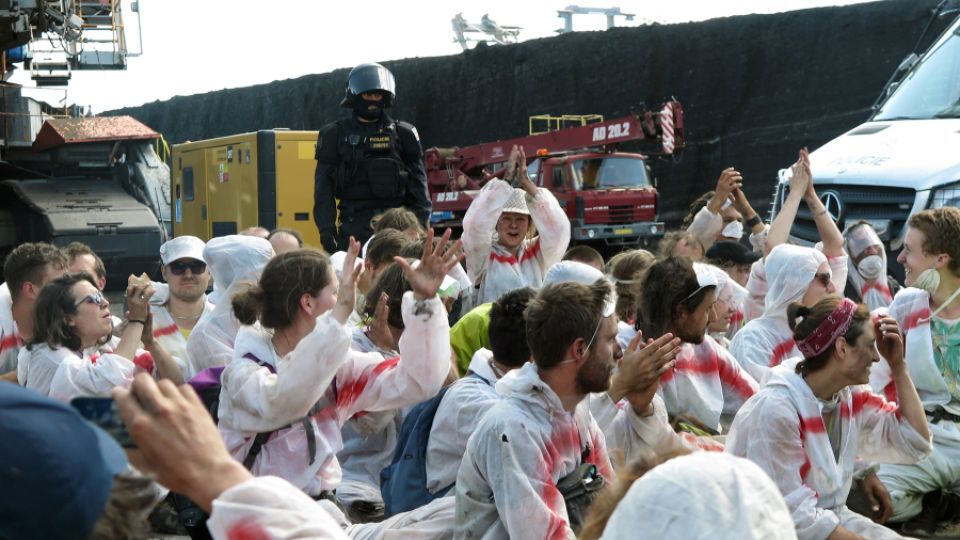GENEVA/PRAGUE - We are living in a time of triple planetary crisis. Climate change, toxic pollution and a loss of biodiversity are intensifying and being felt around the world. Alongside this, there are increasing cases of persecution of environmental activists and attempts to prevent local communities from defending their environment. Last week, the public’s right for environmental protection was discussed at the conference of the parties to the so-called Aarhus Convention at the United Nations in Geneva.
"While last year I dealt with ten cases of persecution of environmentalists, this year there are over forty. I am trying to help all the victims, but my team is running up against physical capacity constraints," stated Michel Forst, UN Special Rapporteur on the protection of environmental activists.
The situation in the world was dramatically worsened by the lockdowns resulting from the covid-19 pandemic, under the guise of which some governments and corporations began to pursue problematic agendas with greater aggression. The pressure on natural resources was increased by the subsequent economic crisis and the war in Ukraine. The rise of populism, greenwashing and disinformation campaigns have contributed to the deterioration of the position of environmentalists.
It is clear that persecution of citizens is no longer the exclusive domain of authoritarian countries such as Belarus or Kazakhstan, or of states with dysfunctional and/or corrupt administrations such as Ukraine before the Russian aggression. Today, it affects the entire region of Europe and the former Soviet Union. The UK is suppressing the climate movement and even wants to restrict public meetings. The UN Special Rapporteur is dealing with the absurd case of a man who is to be imprisoned for ten years for participating in an online discussion about the organisation of protests. Climate activists also face persecution in Germany, Slovakia and the Czech Republic.
The number of so-called SLAPP suits is increasing. Their aim is to cause people to incur legal fees and to mentally exhaust them by investigating fictitious crimes – mainly lawsuits for damage to a company's reputation. A typical case is the one of Sunčica Kovačević and Sara Tuševljak, who are defending the Kasindolska River in Bosnia and Herzegovina from the construction of hydroelectric power plants that would destroy the unique nature. They are facing a lawsuit by the Belgian company Green Invest.
While the UN works to better protect people affected by the environmental crisis and strengthen their voice, the opposite is also emerging. “The right to participate in environmental decision-making is a powerful tool for people to confront some environmental threats. Thus, industry and states with an economic interest in exploiting the environment are trying to prevent public access to decision-making in new areas. For example, in the drafting of the so-called plastics convention or in the permitting of deep-sea mining," says Martin Skalsky of the NGO Arnika, who attended the Geneva talks.
Members of the Georgian parliament recently passed a law on foreign influence that will allow all media and NGOs funded or co-funded by the EU countries, for example, to be designated as "foreign agents" and then eliminated through administrative red tape. This is clearly inspired by Russia. A similar law led to the liquidation of inconvenient civic initiatives in Belarus in 2021. Hungary adopted a "Russian law" in 2017, Kyrgyzstan did the same this April, and Bosnia and Herzegovina and Slovakia are considering doing the same.
"Across the European Union, certain investment and infrastructure projects are being fast-tracked on the grounds that they will contribute to a green transformation, and it is assumed that citizens should not comment so as not to delay. This is a clear attempt to exclude the public from assessing projects that have a major environmental impact - and in many cases are not environmentally friendly at all. To tackle the triple planetary crisis, we must defend people's right to information and participation in decision-making. We must also challenge the European arrogance that human rights are only suppressed in Africa, South America or Asia. It is happening in our own countries, and we must stand up to it," says Martin Skalský of Arnika.
The Aarhus Convention (officially Convention on Access to Information, Public Participation in Decision-making and Access to Justice in Environmental Matters) is an integral part of international law that has been in place for over two decades. It enshrines the public's right to access environmental information, the right to participate in decision-making processes and independent courts. An important part of the convention is the general protection of environmentalists against persecution. Thirty-seven countries and the European Union have ratified the Convention. It has been in force in the Czech Republic since 2004.
More information:
- SLAPP (strategic litigation against public participation) lawsuits target public participation in decision-making processes. These are designed to intimidate and silence active citizens through long trials and high fees. An example of a SLAPP case in the Czech context is an lawsuit against 90 climate activists by mining company Severočeské doly a.s. (Northern Czechia Mines).
- In the publication "Environmental rights in the times of coronavirus" Arnika maps 15 cases from the EU, Eastern Europe and Central Asia. It analyses how some countries have used the covid-19 pandemic to push through controversial projects and legislative changes that would normally face public and civil society opposition.
- The Belgian company Green Invest is planning to build two small hydropower plants on the Kasindolska River in eastern Sarajevo. These projects were opposed by the local community, led by two young women activists, who were subsequently sued by the company for alleged defamation. Meanwhile, the Constitutional Court of Bosnia and Herzegovina recently confirmed the annulment of the permits for the two projects, which were issued without consulting the local community and therefore illegally. Read more about the case here.
- Following the fraudulent 2020 presidential elections, a repressive campaign to stifle criticism and suppress independent media and civil society intensified in Belarus. NGO activists have often been condemned for organising events that 'grossly violate public order' or for allegedly participating in 'extremist groups'. By 2023, some 900 civil society organisations had been forcibly dissolved; a further 500 had decided to close because of pressure on their members and staff. In response to an investigation by the Aarhus Convention Compliance Committee, Belarus withdrew from the international agreement in 2022.
- On the website www.stop-persecution.org Arnika collects stories of environmental defenders from Europe and the former Soviet Union who are persecuted for their activities – and tries to ensure that their stories do not end in oblivion.
For more information, please contact Arnika's international communication officer, Jan Kašpárek (This email address is being protected from spambots. You need JavaScript enabled to view it. / +420 776 529 296).







